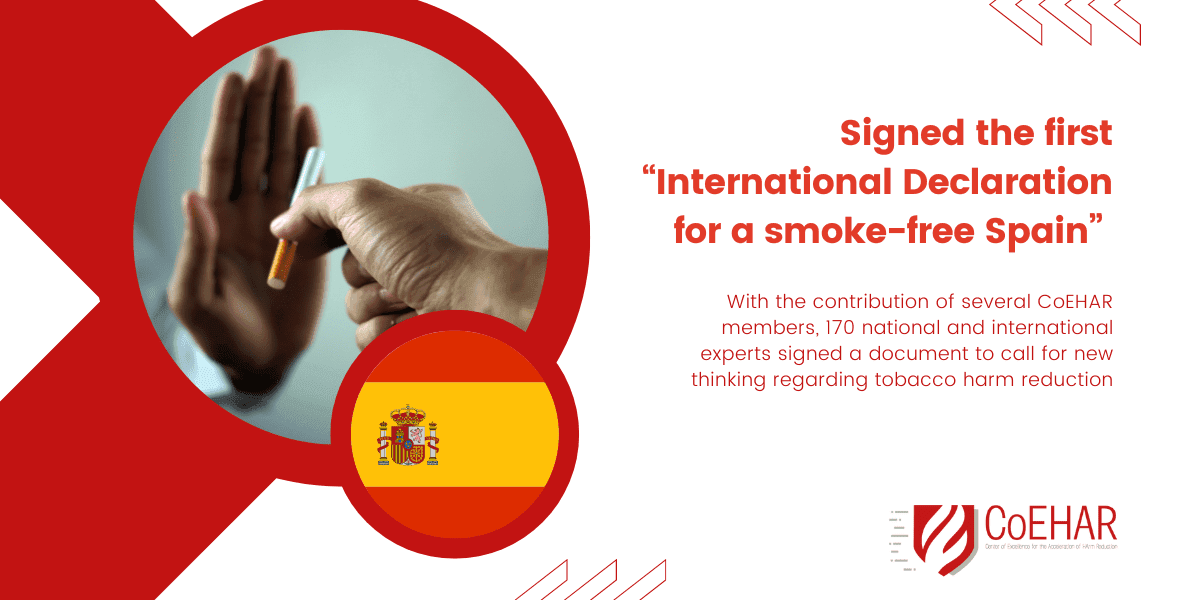Due to the failure of conventional smoking-cessation approaches, 170 national and international experts have come together to sign the first “International Declaration for a smoke-free Spain” to call for new thinking regarding tobacco harm reduction.
The fight against smoking in Spain is entering a new and delicate stage. In the Mediterranean country, the common attitude towards smokers who want to quit for good has been focus only on cessation and prevention, the traditional “quit or die” approach.
Watch the video of the presentation
A strategy that led the Spanish government to launch a 2021-2025 anti-smoking plan, the so-called “Comprehensive Plan for Prevention and Control of Smoking”, to update the 2005 law.
The Plan aims to reduce the percentage of smokers to 10% by 2040, through a series of measures including the increase in tobacco taxation, the removal of pictures from cigarette packets and the launch of new antismoking regulations in public places (parks, beaches, etc).
Unfortunately, the law is still going through the administrative process.
According to the latest EDADES 2019/20201 survey, Spain today has the same smoking rates, 32.3% of the population between 15 and 64 years of age, as in 2005, 32.8%, just before the approval of what is known as the first anti-smoking law.
A standoff that essentially marks the failure of the traditional anti-smoking policies based mainly on an aggressive and authoritarian line that asks smokers to simply quit, through regulations that make the purchase and use of conventional cigarettes difficult.
In this delicate moment, 170 national and international experts have come together to sign the “International Declaration for a smoke-free Spain”, directed to Spanish authorities. The declaration is an essential document which includes a series of proposals for a comprehensive approach in the fight against smoking that takes into account tobacco harm reduction strategies to help those who can’t or wan’t quit smoking.
The document was signed also by several members of the CoEHAR, the Center for Excellence for the acceleration of Harm Reduction of the University of Catania, not new to similar initiatives.
As in the text, the experts believe that “Spanish authorities have a golden opportunity to apply new measures in the fight against the diseases caused by smoking that are giving significant results in those countries where they are already being applied”.
Less harm: International Declaration for a Smoke-Free Spain
The full text contains a series of proposals that take into account the real situation of smokers and possible alternative strategies that can give positive results in the fight against smoking.
- Prevention and cessation have been and are key pillars in the fight against smoking, but they are not enough
- In Spain, at least 4.5 million people are unable to quit smoking despite having tried to do so and only 35% of smokers succeed in quitting with the usual cessation tools. It is essential to support tools and strategies that reduce the harm that comes form smoking, such as electronic cigarettes and heated tobacco products.
- As with any issue affecting public health, science should be at the core of any health plan, not preconceived ideas, sensationalism or opinions
- More training for health professionals and more information for smokers.
- Harm reduction products need differentiated treatment and regulation
- More restrictions on combustible tobacco products
- Learn from the experience of other countries that encourage the use of harm reduction tools for adult smokers, such as England
- Promoting research on these products




